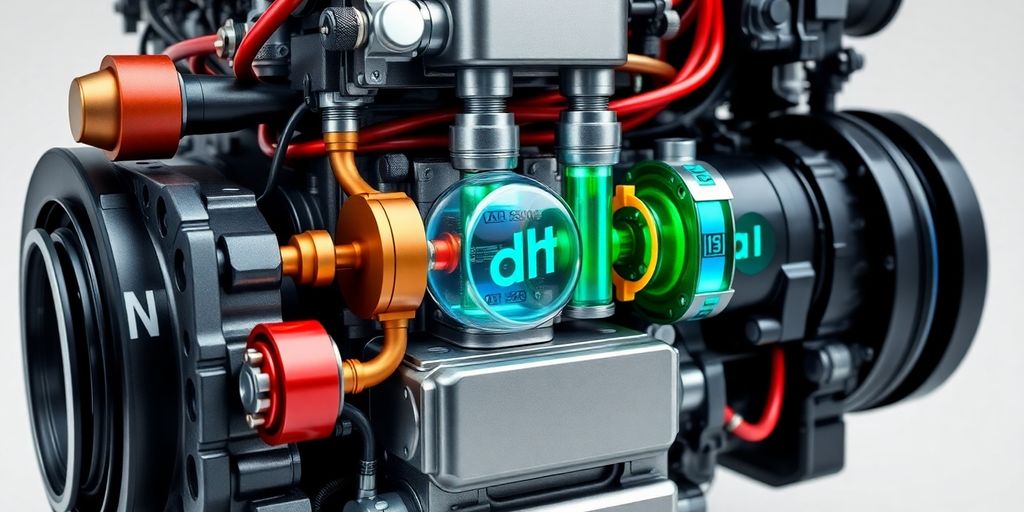Exploring the Feasibility: Is it Possible to Convert a Diesel Engine to Hydrogen?

Thinking about switching diesel engines to hydrogen? Sounds like something from a sci-fi movie, right? But it’s not. People are seriously looking into it. With the planet warming up and fossil fuels being a big no-no, hydrogen’s getting a lot of buzz. It’s clean, it’s got potential, and it might just be the future of engines. But is it really doable? Let’s break it down and see what’s what.
Key Takeaways
- Hydrogen can power engines in two main ways: through combustion or fuel cells.
- Converting diesel engines to run on hydrogen involves significant mechanical changes.
- Hydrogen engines can significantly reduce CO2 emissions compared to diesel.
- Infrastructure for hydrogen fuel is still developing and isn’t widespread yet.
- Economic factors and government policies will heavily influence hydrogen adoption.
Understanding Hydrogen Combustion Engines
How Hydrogen Combustion Works
Hydrogen combustion engines operate on a principle that’s not too different from traditional internal combustion engines. Here’s the deal: hydrogen gas is injected into the combustion chamber, mixing with air. A spark plug ignites this mixture, causing combustion. This reaction generates energy, which pushes the pistons, creating mechanical power. The neat part? The main byproduct is water vapor, not CO2, making it a cleaner alternative.
Benefits of Hydrogen Combustion Engines
- Reduced Emissions: One of the biggest perks is the reduction in CO2 emissions. Since the primary byproduct is water vapor, these engines have a much smaller carbon footprint.
- Familiar Technology: Manufacturers can adapt existing engine designs for hydrogen, which means they don’t have to start from scratch.
- Renewable Fuel Source: Hydrogen can be produced from renewable resources, like water, making it a sustainable option.
Challenges of Hydrogen Combustion Engines
- NOx Emissions: While CO2 emissions are low, the high temperatures in hydrogen combustion can produce nitrogen oxides (NOx), which are pollutants.
- Hydrogen Storage: Storing hydrogen safely is tricky. It requires high-pressure tanks, which can be bulky and raise safety concerns.
- Fuel Infrastructure: There aren’t as many hydrogen fueling stations as there are for gasoline or electric vehicles, which limits practicality.
Hydrogen combustion engines hold promise as a cleaner alternative, but they come with their own set of hurdles. Managing emissions and developing infrastructure are key to their future success.
Exploring Hydrogen Fuel Cell Technology
How Hydrogen Fuel Cells Work
Hydrogen fuel cells are pretty nifty. They transform hydrogen gas into electricity through a chemical reaction. Here’s a quick breakdown:
- Electrochemical Reaction: Hydrogen enters the fuel cell, where a catalyst splits it into protons and electrons. The protons pass through a membrane, while the electrons take a detour through an external circuit, creating electricity.
- Electric Motor: This electricity powers an electric motor, moving the vehicle’s wheels.
- Byproducts: The only leftovers from this process are water vapor and heat, making it a clean energy source.
Unlike traditional combustion engines that burn fuel, hydrogen fuel cells generate electricity to power vehicles, avoiding emissions.
Benefits of Hydrogen Fuel Cell Engines
Hydrogen fuel cells come with some sweet perks:
- Zero Emissions: They don’t produce harmful emissions, making them one of the cleanest energy options out there.
- Quiet Operation: These engines are super quiet, offering a smooth and peaceful ride.
- Long Range: They promise longer driving ranges than battery-electric vehicles, and refueling is quick, similar to gas or diesel vehicles.
Challenges of Hydrogen Fuel Cell Engines
But it’s not all sunshine and rainbows. Here are a few hurdles:
- Cost: Making hydrogen fuel cells is pricey, thanks to materials like platinum used in the catalyst.
- Hydrogen Production: While hydrogen is abundant, creating it sustainably is tricky. Most of it comes from natural gas, which isn’t the cleanest method.
- Limited Infrastructure: Hydrogen fueling stations are scarce, especially outside major cities.
"Hydrogen fuel cells are a promising clean energy source, but they need more infrastructure and cost reductions to become mainstream."
In summary, hydrogen fuel cells offer a clean, quiet, and efficient alternative to traditional engines, but the challenges of cost and infrastructure need addressing for broader adoption.
The Process of Converting Diesel Engines to Hydrogen
Converting a diesel engine to run on hydrogen involves several key steps. This process not only requires mechanical changes but also adjustments to engine management systems to ensure optimal performance and efficiency.
Mechanical Modifications Required
To start with, the diesel engine needs specific mechanical modifications. These changes primarily focus on the intake and exhaust systems, which are essential for the hydrogen-diesel dual-fuel operation. The integration of hydrogen injectors and a hydrogen rail into the intake manifold is crucial. This setup allows for precise hydrogen metering and distribution. Additionally, the combustion chamber geometry might need tweaking, such as adjusting the compression ratio or piston bowl design, to accommodate hydrogen’s unique combustion characteristics.
Engine Management Adjustments
Switching from diesel to hydrogen isn’t just about mechanical changes; the engine’s management system needs a complete overhaul too. This includes developing new functionalities for hydrogen port fuel injection and managing load exchange and combustion. The existing system must be adapted to control the hydrogen fuel flow precisely and ensure efficient combustion. This involves integrating sensors and controls that can handle the unique properties of hydrogen.
Prototype Testing and Optimization
After the mechanical and management systems have been adjusted, prototype testing is the next step. This phase involves rigorous testing of the modified engine to ensure it meets performance expectations. During testing, data is collected and analyzed to identify areas for further optimization. It’s a trial-and-error process, often requiring multiple iterations to fine-tune the system. Prototype testing is essential to validate the engine’s performance and reliability before it can be used in real-world applications.
Transitioning diesel engines to hydrogen is a promising step toward sustainable transportation, but it requires careful planning and execution. With the right modifications and testing, these engines can offer a cleaner alternative to traditional diesel engines.
In summary, converting diesel engines to hydrogen involves significant mechanical and electronic adjustments, followed by extensive testing to ensure that the new system operates efficiently and reliably. This process not only reduces carbon emissions but also pushes the boundaries of what’s possible in engine technology. As more advancements are made, we may see broader adoption of hydrogen-powered engines in various sectors.
Environmental Impact of Hydrogen-Diesel Dual-Fuel Engines

Reduction in CO2 Emissions
Switching from pure diesel to a hydrogen-diesel dual-fuel system can significantly cut down on CO2 emissions. When hydrogen is burned, the only byproduct is water vapor, making it a much cleaner alternative. This shift can lead to a substantial reduction in the carbon footprint of heavy-duty vehicles, which are traditionally big polluters. Some studies even suggest that using a steam/hydrogen mixture can further enhance emission reductions, particularly in reducing carbon monoxide and hydrocarbons.
Impact on NOx and Soot Particles
While hydrogen combustion is cleaner in terms of CO2, it doesn’t completely eliminate all pollutants. The high temperatures involved in hydrogen combustion can still produce nitrogen oxides (NOx), which are harmful pollutants contributing to smog and respiratory issues. However, the blend with diesel can help manage these emissions better than diesel alone, leading to reductions in soot particles. This is crucial for improving air quality, especially in urban areas.
Efficiency and Performance Improvements
Hydrogen-diesel dual-fuel engines aren’t just about cutting emissions; they also offer efficiency perks. These engines can potentially deliver better fuel economy by optimizing the combustion process. The dual-fuel setup allows for a more complete burn of the diesel, which means less fuel is wasted. This efficiency can lead to cost savings and improved performance, making it an attractive option for industries looking to balance environmental concerns with operational needs.
Adopting hydrogen-diesel dual-fuel technology could be a game-changer for reducing the environmental impact of heavy-duty engines, providing a pathway to cleaner, more efficient transportation solutions.
Incorporating hydrogen into diesel engines is a promising step forward, but it’s not without its challenges. Balancing the reduction of CO2 with the management of NOx emissions is key to maximizing the environmental benefits of this technology. As the technology evolves, we can expect further improvements and optimizations that will make these engines even more viable for widespread use.
Infrastructure and Technological Advancements
Hydrogen Production and Storage
Hydrogen production is a big deal when it comes to making hydrogen engines work. Right now, most hydrogen comes from natural gas, which isn’t exactly clean. But with electrolysis, we can split water into hydrogen and oxygen using electricity. If we use renewable energy for this, it’s a win for the environment. Storage is another puzzle. Hydrogen is super light, so it takes up a lot of space. Compressing it or turning it into liquid helps, but both methods have their challenges.
Development of Fueling Stations
Building more hydrogen fueling stations is crucial. Without them, hydrogen cars are like fish out of water. Most stations are in big cities, leaving rural areas in the lurch. Governments and companies are investing in more stations, but it’s slow going. Imagine having a car that you can’t fill up because there’s no station nearby. That’s the reality for many potential hydrogen car owners.
Technological Innovations in Hydrogen Engines
Tech keeps moving forward, and hydrogen engines are no exception. 3D printing is changing the game by allowing for complex designs that weren’t possible before. It’s like giving engineers a magic wand. This tech not only makes engines lighter but also cuts costs. As we keep pushing the boundaries, hydrogen engines will become more efficient and affordable.
Economic and Policy Considerations

Cost of Conversion and Maintenance
Switching a diesel engine to run on hydrogen can be pricey. The upfront costs include mechanical changes, engine management systems, and hydrogen storage solutions. These costs can be a significant barrier for many potential adopters. However, over time, the savings on fuel and maintenance might offset the initial investment. Hydrogen engines generally have fewer moving parts, which means less wear and tear and potentially lower maintenance costs. Still, the specialized nature of the technology means that finding skilled technicians can be a challenge.
Government Policies and Incentives
Governments around the world are trying to push for cleaner technologies, and hydrogen is a big part of that push. Many countries offer incentives like tax breaks, grants, or subsidies to encourage the adoption of hydrogen technologies. These incentives can significantly reduce the overall cost of conversion and operation. However, the availability and size of these incentives vary widely from one region to another. It’s crucial to stay informed about local policies to take full advantage of them.
Market Potential and Adoption Rates
The market for hydrogen technology is still in its early stages, but it’s growing. As more hydrogen solutions become available, the adoption rates are expected to rise. Heavy-duty transport sectors, like buses and trucks, are showing particular interest due to the environmental benefits and potential cost savings. Yet, the market is still developing, and widespread adoption will depend on factors like infrastructure development and technological advancements. The potential is there, but it might take time to fully realize it.
As the world moves towards more sustainable solutions, hydrogen could play a key role. The economic and policy landscape will be crucial in determining how quickly and effectively this transition happens.
Case Studies and Real-World Applications
Urban Bus Conversion Projects
In recent years, there’s been a significant push to convert urban buses from diesel to hydrogen-diesel dual-fuel systems. One notable project, HyDie, explored this transition by retrofitting a typical diesel engine with hydrogen capabilities. This 18-month research initiative focused on reducing CO2 emissions and improving efficiency. By substituting diesel with hydrogen, the project achieved considerable reductions in diesel-combustion pollutants. The study’s findings suggest that such conversions are not only feasible but also beneficial for urban environments striving for cleaner air.
Industrial and Commercial Use Cases
Beyond public transportation, industrial sectors are also experimenting with hydrogen-diesel dual-fuel technology. Companies like CMB.TECH are leading the charge, using 3D printing to enhance component functionality and manage complexity. Their dual-fuel systems have shown potential in reducing CO2 emissions by up to 80% in certain applications. This technology is particularly appealing to industries aiming for carbon neutrality by 2050, as it offers immediate CO2 savings and meets the growing demand for greener solutions.
Future Prospects and Developments
Looking ahead, the future of hydrogen-diesel engines appears promising. As more prototypes are tested and optimized, the technology will likely become more accessible and cost-effective. Innovations in hydrogen injection methods and engine management systems are expected to further enhance performance and efficiency. The ongoing development in this field indicates a strong potential for broader adoption across various sectors, paving the way for a more sustainable future in transportation and industry.
The shift towards hydrogen-diesel dual-fuel engines is not just a technological advancement; it’s a step towards a cleaner, more sustainable future. With continued innovation and adoption, these engines could play a crucial role in reducing global emissions and advancing environmental goals.
Conclusion
So, can you really swap out diesel for hydrogen in an engine? Well, yeah, it’s possible, but it’s not a walk in the park. There’s a lot to consider, like the tech tweaks needed and the infrastructure that’s gotta catch up. Hydrogen engines, whether they’re burning hydrogen directly or using it in fuel cells, show a lot of promise for cutting down emissions. But, the road to making them mainstream is still kinda bumpy. We need more hydrogen stations and better tech to store and use hydrogen safely. Plus, getting policies and incentives in place to support this shift is crucial. It’s clear that hydrogen could play a big role in the future of clean energy, but there’s still a lot of work to do before it becomes a go-to option for everyone.
Frequently Asked Questions
What is a hydrogen combustion engine?
A hydrogen combustion engine is like a regular car engine but uses hydrogen instead of gasoline or diesel. It burns hydrogen gas to make the car move.
How do hydrogen fuel cells work?
Hydrogen fuel cells make electricity by mixing hydrogen with oxygen. This electricity powers the car’s electric motor, and the only thing coming out of the car is water vapor.
Can we change a diesel engine to run on hydrogen?
Yes, it’s possible to change a diesel engine to use hydrogen, but it needs special parts and changes to work safely and efficiently.
What are the benefits of using hydrogen in engines?
Hydrogen engines can help the environment because they produce less pollution. They also use a fuel that can be made from water, which is renewable.
What challenges do hydrogen engines face?
Hydrogen engines need special tanks to hold the fuel safely, and there aren’t many places to fill up with hydrogen yet. Also, they can still make some pollution like NOx.
Are there any real-world examples of hydrogen engines?
Yes, some buses and trucks have been changed to use hydrogen, and some car companies are making new cars that run on hydrogen.








Responses